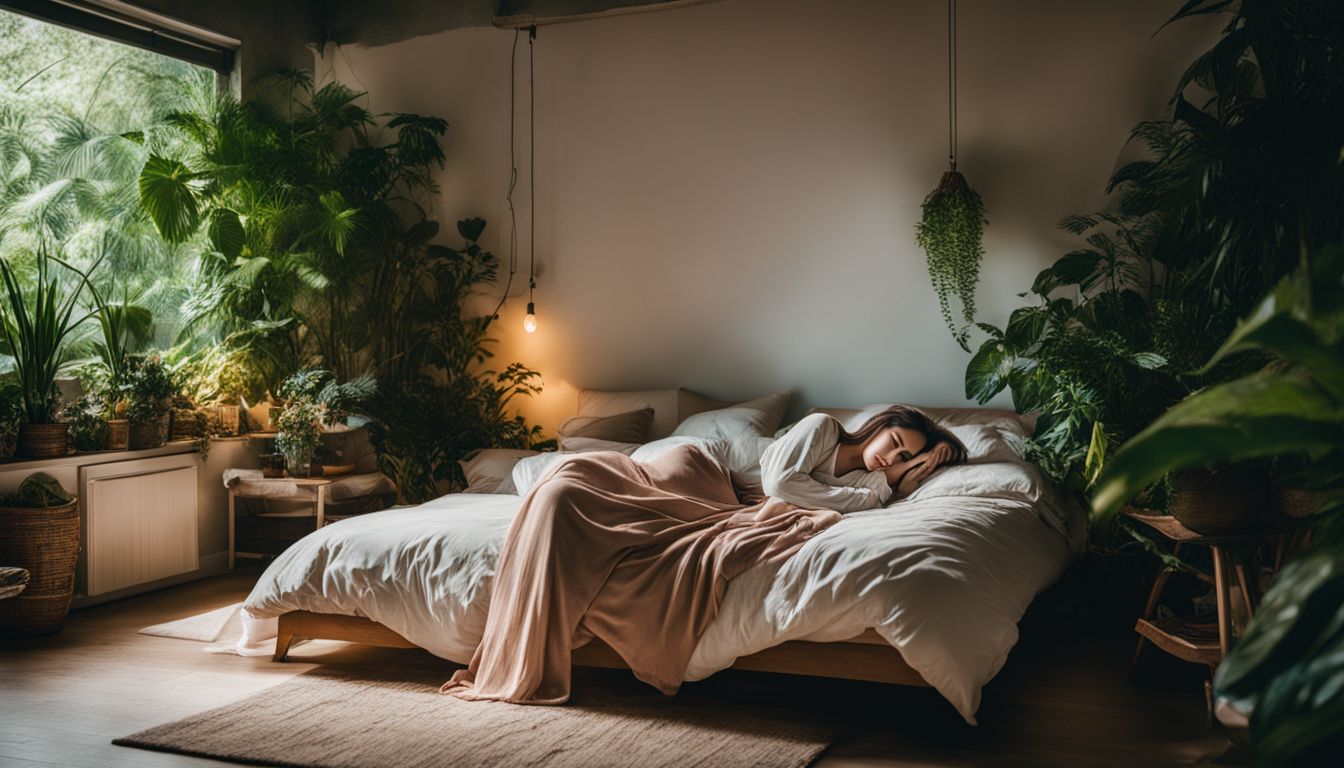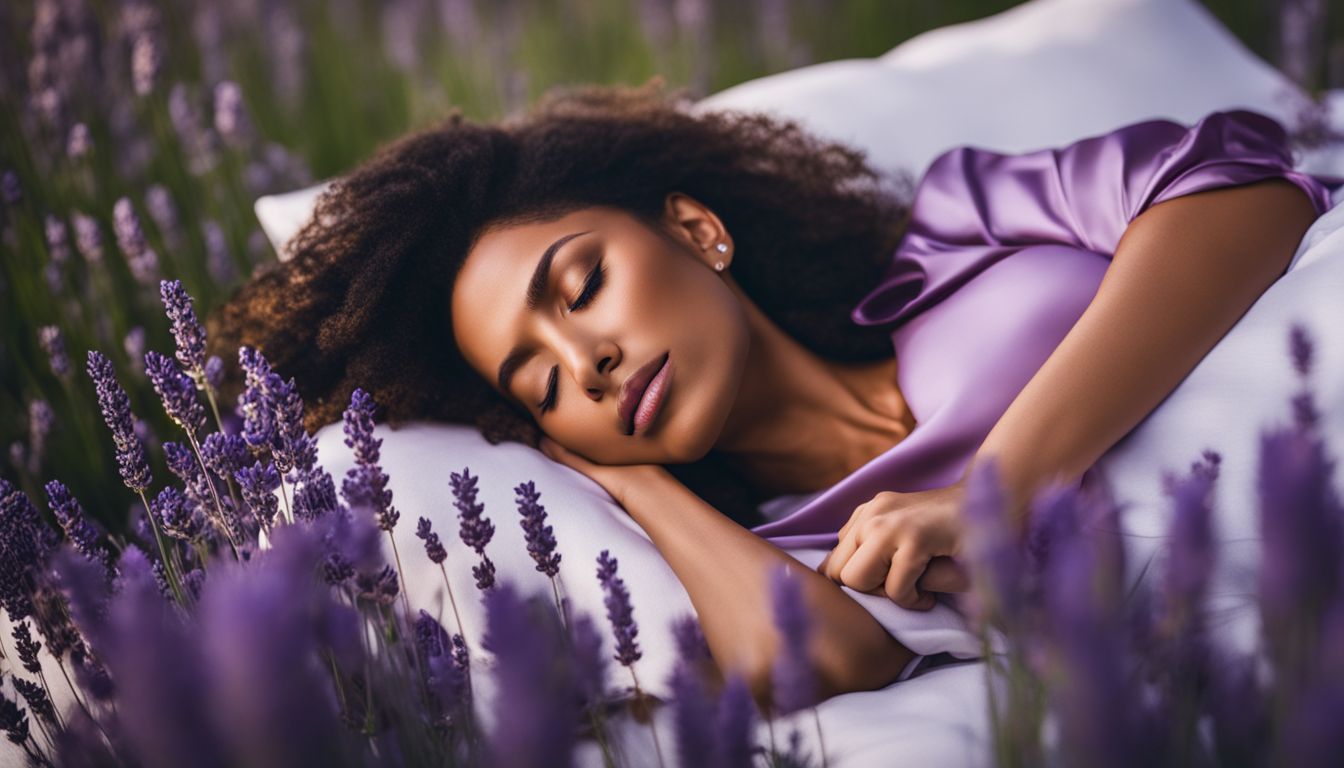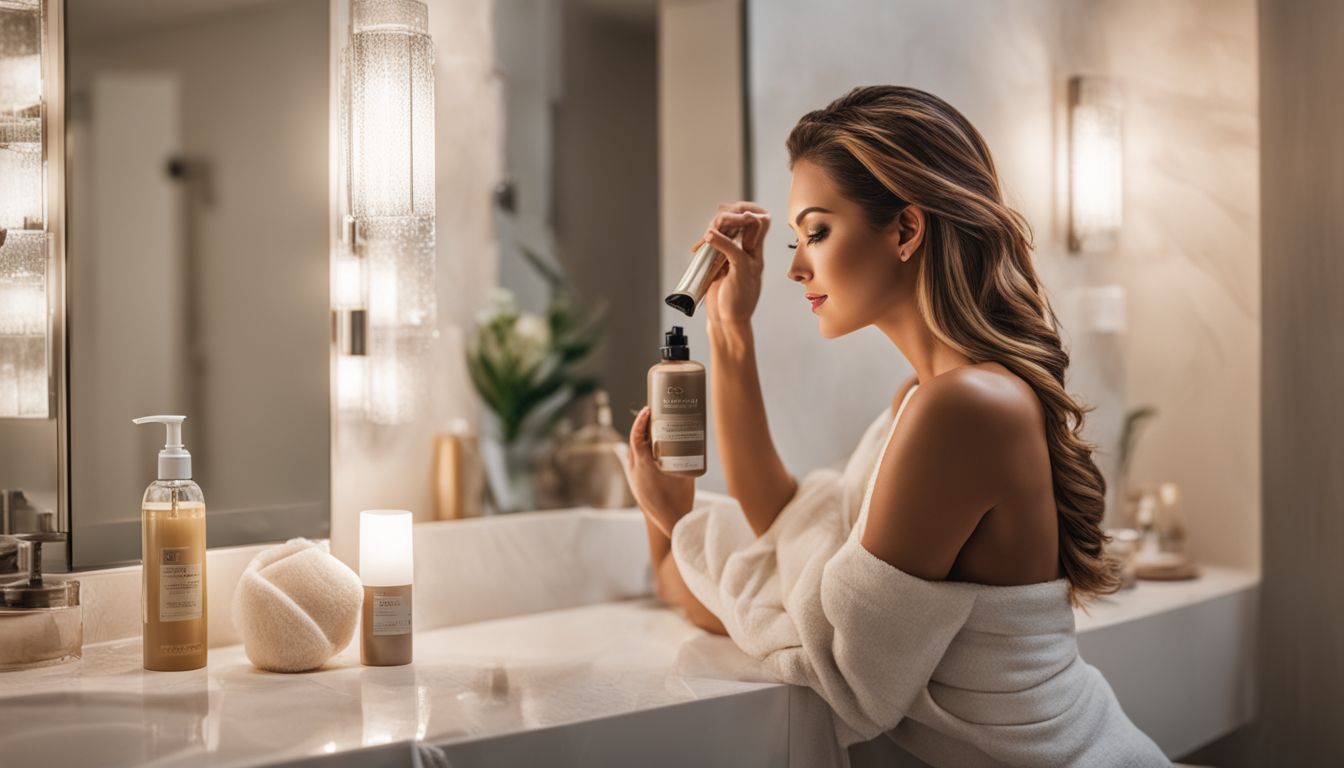
Struggling with hair loss can be tough, but you’re not alone. Melatonin, more than just a sleep aid, may hold the key to lusher locks. Our guide will reveal how this hormone could tackle thinning hair and boost growth.
Dive in for some surprising hair care tips!
Key Takeaways
- Melatonin can extend the growth phase of hair, increase hair density, and reduce loss, especially in those with androgenetic alopecia.
- While not a DHT blocker, melatonin contributes to healthier sleep patterns which indirectly support the health and growth of hair follicles.
- Topical application of melatonin has been shown to be safe for hair growth with minimal side effects reported in studies.
- Combining melatonin with other treatments like minoxidil or biotin products may offer a multifaceted approach to combatting hair loss.
- Lifestyle factors such as diet, stress reduction, exercise, and proper hair care routines are essential for optimal results when using melatonin for hair health.
Understanding Melatonin

Melatonin, a hormone made by the pineal gland in the brain, plays a critical role in regulating sleep-wake cycles. It signals to your body when it’s time to go asleep, tapping into our natural circadian rhythms.
People often think of melatonin solely concerning sleep; however, this powerful hormone exerts effects on various bodily functions beyond just helping us drift off at night. It impacts immune system performance and blood pressure regulation.
Research also suggests that melatonin might contribute positively to hair health. This is because it can act indirectly on hair follicles, potentially promoting growth and extending the anagen phase – the active period where hair strands grow.
Melatonin’s antioxidative properties could defend cells against oxidative stress that leads to aging and disease – with implications for preventing pattern hair loss or other forms of balding and thinning.
As such, considering melatonin supplements under proper guidance may offer complementary benefits for those looking after their hair health or struggling with conditions like male pattern baldness or female pattern baldness.
The Role of Melatonin in Hair Loss and Hair Growth

Melatonin plays a crucial role in regulating the hair cycle and promoting hair growth. It also contributes to sleep quality, which in turn can impact hair health.
Melatonin and Hair Cycles
Hair grows in stages, and melatonin might play a key role in these cycles. Studies suggest that this hormone can extend the active growth phase, known as the anagen stage. By doing so, it gives your hairs more time to grow before they fall out.
Melatonin also interacts with specific receptors in hair follicles, directly influencing hair growth on a cellular level.
This interaction means melatonin could be crucial for keeping your locks thick and preventing them from thinning too early. Since hair cycle regulation is vital for maintaining healthy hair density, incorporating melatonin might just give you an edge against common issues like androgenetic alopecia or pattern baldness.
With its ability to act on both sleep patterns and hair cycles, melatonin presents a dual-benefit approach to managing hair health.
Melatonin, Sleep and Hair Growth
Melatonin plays a vital role in regulating our sleep cycles, which is essential for healthy hair growth. During deep sleep, the body repairs itself and balances hormone levels, including those that affect hair follicles.
Ensuring you get adequate rest can boost these natural processes. Good quality sleep triggers the release of enzymes and growth hormones necessary for repairing hair damage and promoting growth.
Applying melatonin directly to the scalp has been shown to improve hair density and reduce loss, particularly in cases of androgenetic alopecia. This form of treatment capitalizes on melatonin’s potential to interact with estrogen and androgen receptors important for hair cycle regulation.
By incorporating proper sleep hygiene into your routine, you support melatonin production naturally which can lead to noticeable improvements in hair health over time.
Does Melatonin Prevent Hair Loss?
As we consider the impact of sleep on follicle health, it’s natural to question whether melatonin directly combats hair loss. Research in the International Journal of Trichology suggests that because melatonin possesses antioxidant properties and contributes to hair cycles, its topical application could be beneficial.
Studies indicate applying this hormone might extend the growth phase of hair and enhance density.
Scientists have observed improved hair fullness among individuals using melatonin treatments, suggesting a connection between these treatments and preventing excessive shedding. While not every person experiences the same results, clinical studies highlight a promising trend where melatonin helps maintain a fuller head of hair by potentially protecting against environmental stressors known for causing thinning or weakening strands.
It’s important to note that while positive effects are reported, further research is needed to firmly establish melatonin as a preventive measure for hair loss across diverse populations.
The Connection Between Melatonin and Hair Growth

Melatonin is linked to hair growth through its potential to regulate the hair growth cycle and interact with melatonin receptors in the hair follicles. Topical application of melatonin has shown promise in reducing hair loss and increasing hair density, especially in individuals with androgenetic alopecia.
Although the exact mechanisms remain unclear, good sleep is crucial for overall hair health as it aids protein synthesis and facilitates the release of growth hormones necessary for optimal hair growth.
The role of melatonin in promoting healthy sleep patterns should not be overlooked, as it directly supports essential processes required for maintaining robust, healthy hair. Furthermore, applying melatonin topically may offer a non-invasive approach to prevent further hair loss and stimulate new growth.
Moving forward, let’s explore other effective treatments that complement or enhance the effects of melatonin on promoting healthy hair growth.
Other Hair Growth Treatments

In addition to melatonin, there are other hair growth treatments available such as minoxidil, finasteride and minoxidil combination, hair thickening shampoos, and biotin products. It’s important to consider these options in conjunction with lifestyle adjustments for enhanced hair growth.
Minoxidil
Minoxidil is a scientifically proven treatment that effectively halts hair loss and stimulates new hair growth. It has been shown to be particularly effective in addressing androgenetic alopecia, a common cause of hair thinning in both men and women.
When applied topically, minoxidil promotes blood flow to the scalp, which can revitalize shrunken hair follicles and encourage regrowth. This over-the-counter medication comes in various forms, including foam or liquid solutions, making it convenient for individuals seeking to address their hair loss concerns.
Research studies have demonstrated the efficacy of minoxidil as a reliable solution for those experiencing hair loss. By actively stimulating dormant follicles and prolonging the growth phase of the hair cycle, minoxidil provides tangible results for many individuals struggling with thinning or receding hairlines.
Finasteride and Minoxidil
Finasteride and Minoxidil are two widely used treatments for hair growth. They have been shown to effectively promote hair regrowth in individuals dealing with androgenetic alopecia, also known as male or female pattern baldness.
Finasteride works by reducing the production of dihydrotestosterone (DHT), a hormone that contributes to hair loss, while Minoxidil is thought to increase blood flow to the scalp, stimulating hair follicles and promoting new growth.
Both treatments have been recognized for their potential in slowing down or reversing the progression of hair loss, making them popular options for those seeking solutions for thinning hair.
Hair Thickening Shampoos
Moving on from considering Finasteride and Minoxidil, another option for promoting hair thickness and fullness is the use of hair thickening shampoos. These specialized shampoos contain ingredients designed to add volume and density to the hair, such as proteins, vitamins, and conditioners.
These shampoos work by coating the hair strands with moisturizing agents that increase the diameter of each strand. This can create an appearance of thicker, fuller hair while also nourishing and strengthening the strands.
When used consistently as part of a comprehensive hair care routine, these shampoos may contribute to overall improved hair health and appearance.
Biotin Products
Transitioning from discussing hair thickening shampoos to exploring other complementary hair growth treatments, biotin products play a significant role in promoting healthy hair. Biotin, also known as vitamin H, is essential for the health of your hair and may accelerate its growth.
Biotin products can be used alongside other hair growth treatments like melatonin to provide comprehensive support for addressing hair loss and promoting regrowth. When used in combination with melatonin, these biotin products offer a holistic approach to improving the overall condition of your hair.
Also recognized as vitamin B7 or coenzyme R, biotin encourages the production of keratin – a key structural protein that makes up our skin, nails and most importantly, our hair. This nutrient assists in maintaining healthy-looking scalp and thicker strands by nourishing both the follicles and the cells responsible for their function.
Lifestyle Adjustments for Enhanced Hair Growth
“Making lifestyle adjustments such as eating well, reducing stress, exercising, and tweaking your hair care routine can contribute to enhanced hair growth. To learn more about how these adjustments can benefit your hair health, keep reading!”.
Eat Well
To promote healthy hair growth, it is essential to maintain a balanced diet that includes a variety of nutrients. Foods rich in protein, such as lean meats, fish, eggs, and legumes, help in the production of keratin, which is essential for strong hair.
Additionally, incorporating foods high in iron and vitamin C aids in maintaining proper blood circulation to the scalp and supports overall hair health. Consuming adequate levels of omega-3 fatty acids found in nuts, seeds, and oily fish can also contribute to nourishing the scalp and promoting shiny and lustrous hair.
Incorporating whole grains that are rich in vitamins B and E helps support healthy hair follicles by providing necessary nutrients for growth. Furthermore, consuming sufficient fruits and vegetables provides antioxidants that combat oxidative stress on the scalp while ensuring an optimal environment for healthy hair growth.
Reduce Stress
To reduce stress, consider incorporating relaxation techniques such as deep breathing, meditation, or yoga into your daily routine. Engaging in regular physical exercise can also help alleviate stress and improve overall well-being.
Additionally, getting an adequate amount of sleep each night is crucial for managing stress levels and promoting hair health.
Making small lifestyle adjustments to minimize stress can have a positive impact on hair growth. Next, let’s explore the role of exercise in enhancing hair growth.
Exercise
In addition to reducing stress, incorporating regular exercise into your routine can also contribute to promoting healthy hair growth. Exercise helps maintain a well-balanced diet and body weight, which are essential factors for overall physical health.
Furthermore, physical activity aids in regulating blood sugar and insulin levels, both of which play a role in supporting optimal conditions for hair growth. Additionally, exercise stimulates blood flow to the scalp, ensuring that essential nutrients reach the hair follicles, which is crucial for maintaining strong and healthy hair.
Engaging in consistent physical activity not only supports general wellness but also positively impacts the health of your hair. Regular exercise offers numerous benefits beyond just fitness; it directly contributes to creating an environment conducive to promoting strong and vibrant hair.
Tweak Your Hair Care Routine
To complement your efforts in maintaining a healthy lifestyle, tweaking your hair care routine can contribute to promoting hair growth. Regular shampooing with gentle and sulfate-free products can help keep the scalp clean without stripping it of its natural oils.
Additionally, using a wide-tooth comb to detangle wet hair, instead of brushing, can minimize breakage and prevent further damage.
Incorporating regular trims into your hair care routine is essential for getting rid of split ends and preventing them from traveling up the hair shaft. Furthermore, reducing the use of heat-styling tools and opting for air-drying or utilizing heat protectant sprays can help maintain the overall health of your hair.
Considering Melatonin for Hair Growth
When it comes to considering melatonin for hair growth, it’s important to understand its effectiveness and whether it acts as a DHT blocker. We’ll explore the safety and potential side effects of using melatonin as a treatment for hair loss and growth.
Effectiveness of Melatonin for Hair Growth
Melatonin effectively halts hair loss and promotes regrowth by prolonging the growth phase of hair follicles. It also increases hair density, making it a promising treatment for those experiencing hair thinning or loss.
Topical application of melatonin has shown potential in preventing androgenetic alopecia. Research suggests that it can be an effective treatment for promoting hair growth in patients suffering from this condition.
While there is no definitive evidence to suggest that melatonin directly blocks dihydrotestosterone (DHT), studies have demonstrated its potential for aiding both males and females suffering from various types of hair loss, helping to promote robust hair growth.
Is Melatonin a DHT Blocker?
Melatonin does not directly block dihydrotestosterone (DHT), as there is no conclusive scientific evidence to support this claim. While some studies suggest that melatonin may have potential in promoting hair growth and reducing hair loss, its role as a DHT blocker remains uncertain.
Instead of directly targeting DHT, melatonin is believed to influence hair cycles and promote healthy sleep patterns, which indirectly affects the overall health and growth of hair follicles.
The focus on the relationship between melatonin and DHT should be approached with caution, considering the lack of definitive evidence supporting direct blocking effects. It’s important for individuals seeking solutions for hair loss to consider a holistic approach that encompasses factors beyond solely inhibiting DHT production or action.
Safety and Side Effects of Melatonin for Hair Growth
Synthetic melatonin, when applied topically on a daily basis, is considered safe for promoting hair growth. Studies have shown that this method can effectively prevent hair loss and stimulate new hair follicle growth.
The topical application of melatonin has been found to be well-tolerated with minimal side effects, making it a promising option for those seeking to enhance their hair growth.
Some common side effects of melatonin supplementation may include dizziness, headaches, and nausea. However, when used topically for hair growth, these side effects are rare. It’s important to note that while synthetic melatonin has demonstrated safety in promoting hair growth, consulting with a healthcare professional before starting any new treatment is essential.
Conclusion
In conclusion, melatonin’s role in regulating sleep patterns and its potential impact on hair follicles make it a promising option for promoting hair growth. Good sleep, a balanced diet, stress management, and essential vitamins are equally important for overall hair health.
Exploring topical serums in consultation with a doctor or dermatologist can help combat thinning hair effectively. Regular exercise also plays a crucial role in maintaining healthy blood flow to support optimal hair growth.
FAQs
1. Can melatonin help with hair loss?
Yes, melatonin may benefit individuals with hair loss, as some studies suggest it can promote hair growth and might work as an alternative treatment to prescription-only medications.
2. Does smoking affect my chances of benefiting from melatonin for hair growth?
Smoking could worsen male pattern hair loss, which may lower the effects of health treatments including those using melatonin; quitting smoking is advised for general health improvement.
3. How do I know if melatonin is safe for me to use on my scalp?
Consult your primary care provider or a health professional such as a family nurse practitioner before using any new topical treatment like melatonin to ensure it’s safe and right for you.
4. Are there clinical trials that support the use of melatonin in treating hair loss?
Numerous randomized controlled trials have been conducted, and reviews by bodies such as PubMed indicate potential benefits; however, more research is often suggested by experts in the field.
5. Will taking vitamin D supplements enhance the effect of melatonin on hair restoration?
While nutrient deficiency can contribute to issues like sleep disturbances and depression which might lead to telogen or catagen phases in human hair cycles; combining vitamin D with proper education on dosage could complement treatments including those involving both nutrients’ roles in supporting healthy bodily functions.
6. Is applying minoxidil foam better than using melatonin for fighting against baldness due to conditions like androgenic alopecia?
Minoxidil foam is approved by agencies such as the Food and Drug Administration (FDA) specifically for combating certain types of baldness; nevertheless, consider consulting healthcare providers regarding comprehensive options that may include complementary alternative therapies when available.
